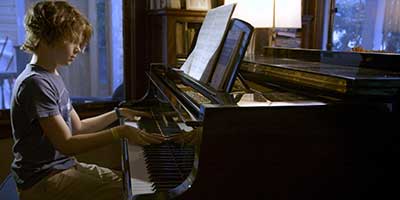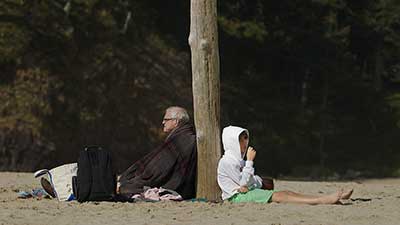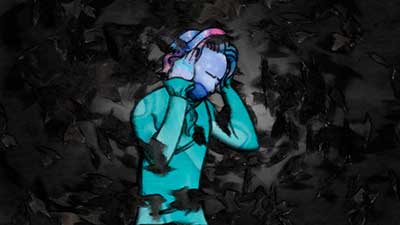
Double Your Impact for the Holidays
Double Your Impact for the Holidays
Your urgently needed year-end gift can go twice as far to provide care and support and accelerate Alzheimer's research this holiday season — and all year long. Show your giving spirit today during this 2x Match Challenge.
Donate Now“Moonlight Sonata: Deafness In Three Movements” Documents a Family Bravely Facing Deafness and Alzheimer’s Disease
“Moonlight Sonata: Deafness In Three Movements," a film premiering on December 11 on HBO, interweaves Alzheimer’s disease, deafness and familial love into one poignant story. We spoke with Oscar-nominated filmmaker Irene Taylor Brodsky about documenting her young deaf son’s journey learning to play Beethoven’s “Moonlight Sonata” as her deaf father is diagnosed with Alzheimer’s.
 Irene, how did your career as a documentarian begin?
Irene, how did your career as a documentarian begin?
My entry into filmmaking was as a child of deaf parents. When I was growing up, both my mom and dad were amateur filmmakers and photographers, and we had a substantial darkroom in our house. It was a wonderland for me as a kid. I would go in with my parents and work in total darkness. We couldn’t communicate in that room in the traditional way: we could only create.
In 2005, when my parents were both 65, they decided that they wanted to try cochlear implantation; they both decided together that they wanted to hear. That was when I made my documentary “Hear and Now,” a coming-of-age love story about these two deaf people I love.
It was key that my parents were very comfortable being film subjects, and that is where we laid the groundwork for their being involved in “Sonata.” Being a documentary subject means learning to be yourself with a camera in the room, and my parents, Paul and Sally, have gotten pretty good at it!
 You are very comfortable telling your family’s story, whether it’s about the deafness of your son Jonas and your parents or your father’s diagnosis of Alzheimer’s. Why was it important to you to include your father’s appointment with his neurologist in “Sonata?”
You are very comfortable telling your family’s story, whether it’s about the deafness of your son Jonas and your parents or your father’s diagnosis of Alzheimer’s. Why was it important to you to include your father’s appointment with his neurologist in “Sonata?”
Before we went to the doctor and had confirmation of Dad’s diagnosis, we noticed profound changes in his life at home, and he too was acutely aware that something was happening to him. I discussed filming with my parents in advance and it was a very thoughtful process. I wanted to capture what it’s like navigating Alzheimer’s disease during and after a diagnosis.
By the time we had scheduled the appointment with a neurologist, my family was open to any kind of guidance so that we could help Dad going forward — and to better educate ourselves. These are moments no one ever wants to experience, but we knew something was changing with Dad, and we knew we had to face whatever it was together.
A topic that is specifically addressed in the film is driving and dementia.
There is a point when I told my dad that I was no longer comfortable with him driving my kids. I knew I was going to tell him that; I just didn't know when. It turns out that after I had mentioned it to my mom, she told him for me.
He was very unhappy about it for a variety of reasons, including the fact that he considered the rides he gave my kids as important time spent with them. My mother texted me and asked if I could explain my reasoning to Dad. I texted back: “Yes, of course. Do you mind if I film the conversation?” She replied: “Fine by us.”
Everyone’s journey with Alzheimer’s or dementia is different, and I realize that my mom being so comfortable filming this conversation is unique. My parents have a history of documenting all of the tough and beautiful moments in our family, so there was no hesitation from either of them. I was lucky to have two people equipped to be brave in front of the camera.
But I also had the unenviable job of telling them my thoughts about my dad ceasing to drive my kids while I was holding the camera. The conversation we have on film was one of the hardest things I’ve ever done as a filmmaker. But I knew I had to include what Dad was experiencing in order to have the good times and the tough times resonate with viewers. Once you make a commitment to document people and their lives, you have to be committed to the truths that come out of honest storytelling.
For many people, driving represents independence. Tell us what driving means for your dad.
Independence is universal, and my father’s loss of independence through driving was particularly poignant. Dad got his driver's license back in the 1950s when deaf people couldn't easily obtain insurance, or even a license! He was so proud to receive his at the age of 14. The first job he ever had was delivering newspapers with his Chevy station wagon.
For Dad, the car represented independence from his disability. He wanted to show the insurance companies: “I'm a good driver. Just watch me.” He never got a ticket once in his entire life, and he never let the tank go below half full when I was growing up. This made the conversation with him on camera all the more difficult, but it was something my mom and I knew had to be done.
 How do you talk to your children about your father’s disease?
How do you talk to your children about your father’s disease?
My son Jonas has a rootedness in his deaf experience that his grandparents really helped him with, and he is the oldest and most mature, so accepting his grandfather’s disease has been a bit easier for him than his two younger brothers. I am so grateful that he could know his grandfather before the dementia started progressing. Their lifelong connection carries into this ever-evolving relationship.
I tell my younger boys that their Papa may not remember that he had a nice conversation with them, but he will always feel joy in the moment he hugs or kisses them. The emotional high he gets from that 15 seconds of affection keeps him happy, keeps his blood flowing. That is something they can comprehend.
I’ve learned to give my dad all the value, love and affection that I possibly can, even when it isn’t easy. Whatever joy I can bring to him is worth doing, whether he remembers it or not. I may never know what Jonas hears when he plays “Moonlight Sonata,” or if Dad will remember Jonas playing it, or what Beethoven meant when he composed that piece of music, but the magic of life is that we can only live in the moment of any experience.
What is your dad’s life like today?
My dad is living three blocks away from me with my mom. He doesn't always remember who I am, or who she is. Mom has fortunately come to a place of peace and acceptance of that. Jonas and my mom can see beyond the illness and know that when the illness is talking versus when Papa is talking.
When my siblings and I were babies, our deaf parents couldn’t hear us cry. Dad was an engineer, so he created a baby cry light which would illuminate whenever one of their babies was crying. Our present challenge as a family is to navigate Alzheimer’s disease as well as he did his deafness. We carry on. Our reality just has a different complexity.
What is some of the best advice you have been given that resonates with you today?
A dear mentor once told me that making a personal film is very tricky, but you’ll know you've succeeded in telling your family’s story if you make the audience feel like they're watching their own family. I hope by sharing my story, viewers may see a bit of themselves and feel comforted to know that they are not alone in their fight.
About Irene: Irene Taylor Brodsky is an Emmy and Peabody-award-winning, Oscar-nominated documentary filmmaker and a graduate of New York University and Columbia University’s Graduate School of Journalism.
All blog photos courtesy of HBO.
Related articles:
Dementia and Driving
Driving Contract
Kids & Teens & Alzheimer’s

The first survivor of Alzheimer's is out there, but we won't get there without you.
Donate Now
Learn how Alzheimer’s disease affects the brain.
Take the Brain Tour
